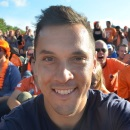When I arrived in London last November for the World Travel Market, I was looking for a job. With a background in the airline industry, I figured the world’s largest travel trade show would be a great place to meet contacts that could open the door to a really cool opportunity. It had been more than two years since I quit my last “normal” job, and I was growing ever more frustrated with my inability to turn a dream and a vision I had developed into a viable business. It was time.
As I had to commute clear across London from my friend-of-friend’s house (who was kind enough to offer up a couch), I got to the ExCeL (Exhibition Centre London) late on the first day. Fortunately, it wasn’t too late, as I just caught the tail end of a talk by a student from Salzburg University of Applied Sciences. His name was Paul, and he spoke about the psychology behind game design, a topic of expertise he completed his thesis on.
I didn’t think much of it, but having been in Paul’s shoes before—a young guy giving a talk to an older crowd—I figured he had fought off nerves and wanted to tell him “good job” (in hindsight, I now know that Paul was, and never is, even the slightest bit nervous). I also thought he looked like Beavis, from the old MTV show of my childhood, and I couldn’t pass up the opportunity to call him that. So I said hello, and we had a chat. As we progressed, we got to talking about my website—Initial Descent—which was something I built totally out of passion for understanding other cultures, but without much of a business model. I thought with Paul’s expertise, maybe there was that one-in-a-million chance that he had an idea that would pump some life back into my dream. read more »
As we started brainstorming, we realized that we had both become frustrated with the channel bias that has pervaded “open source” communication in the past few years. Sites like TripAdvisor, which were supposed to offer a forum for people’s unbiased reviews, was instead hosting major booths at events like WTM, essentially making a business of helping global hotel chains advertise under the cover of “user” reviews. We also were both really interested in mobile, and interested in things visual. The original idea was to morph ID into a mobile app that would help inspire people’s travel experiences, to see and understand the world, through a documentation and “look in” to other people’s honest experiences.
While Initial Descent wasn’t much of a success (although I’ll never say die!), there was one element of it that was really strong, from a design standpoint. I had squeezed every drop of energy out of my creative muscle to design little icons that “represented” various countries through a series of categories—letters, numbers, architecture, shapes, landmarks and cultural icons. Wouldn’t it be great, we thought, if we could make these icons work like hashtags—which is essentially how I was using them on the website. Even at WTM itself, I found myself frustrated with the fragmentation of hashtags as they currently operate—just trying to figure out what events to attend during the show I was annoyed by having to search content tagged as #WorldTravelMarket, #WorldTravel, #WTM, #WTMLondon, #WTM13, etc. All of it was trying to get in front of the same sets of eyeballs.
Of course, we still were worried about bias—and that’s why we wanted to design something anonymous. We didn’t want to emphasize that, so as not to attract the perverts and such that are like trolls in other anonymous networks. But being anonymous allowed us to emphasize honesty, and content being taken for the quality of the content as opposed to who sent it (I have seen enough tweets saying things like “oh hot beezle” coming from Lil’ Wayne being retweeted 6,000 times). And importantly, we also wanted to eliminate any incentive for those trolls—take away any chance for them to get something back for being jerks.
At this point, we felt like we were onto something. Definitely something that would work for travel, as it was initially conceptualized, but also something that would be broader than that. Something that was not out there today, and something that was needed. A social network that is actually designed with people—not greedy advertising interests—in mind. A social network that could actually provide back some user value other than just the approval or disapproval of their network; a break from the eternal popularity contest.
We started playing around with the equation. We thought about how your activities, emotions and secondary emotions, or “results”, could be represented by our Visual Hashtags. We thought these would be able to intelligently connect people based on something other than their identities—but instead based on a common experience. What we ended up with was:
Visual Hashtags + Anonymity + Locations – Judgment = Sideview
While we both had planned to return to our respective homes the day after WTM, Paul to Germany and myself to the US, we felt like we were onto something so big that we decided to stay. We spent the next three weeks refining and focusing our idea, getting possible business models together, and scratching our heads figuring out how to make this become a reality.
In another stroke of good luck, it so happened that Paul knew a guy named Alex, from his native Romania, who is a wizard of a developer and everything you’d expect of a techie (except he lifts weights, too). So we spoke to Alex, who had a team he worked with, and with the help of his buddies Radu, Andrei, Mihai, and Other Mihai (and an alcohol-induced visit by Paul and myself to lovely Brasov, Romania), Sideview was born!
Now the story shifts to you, our users, and we hope it will continue for a long time. It’s too good of a book to put down. « read less
Our team here at Sideview is always on the lookout for talented people. If you’re interested in changing the way we communicate, and you have a true passion for understanding others, then tell us a bit about yourself here. While passion is the only requirement, financial, programming and sales skills are a big plus!
With Sideview, your identity is always protected. When we designed this concept, we didn’t want to even have user profiles. Unfortunately, there are bad people in the world who try to pervert beautiful ideas. Because we (legally) need some way to “police” inappropriate content, hate speech, and other types of bullying, we have to have usernames. Which also happen to come in handy if you get a new phone or something. But your identity will never be displayed with your posts, and there is no way for anyone to search for you, follow you, or otherwise identify you.
Because we also emphasized minimalistic beauty in our interface, we do want to allow you to share those posts that you aren’t worried about keeping private. Maybe you just captured that perfect photo, or are sharing something really inspiring that you want publicly attached to your name. That is why we enable your posts to be shared through your other social networks. But don’t worry—unlike other networks, this sharing will be something you choose to do or not do on a individual post basis, not a “permanent” thing that shares all of your content.
Since we’re just getting started, we have tried to address all of the questions we have gotten from people in the various parts of this page already. But surely we missed some—if you have any questions, please ask us here. Then we can start to post some FAQ’s.



